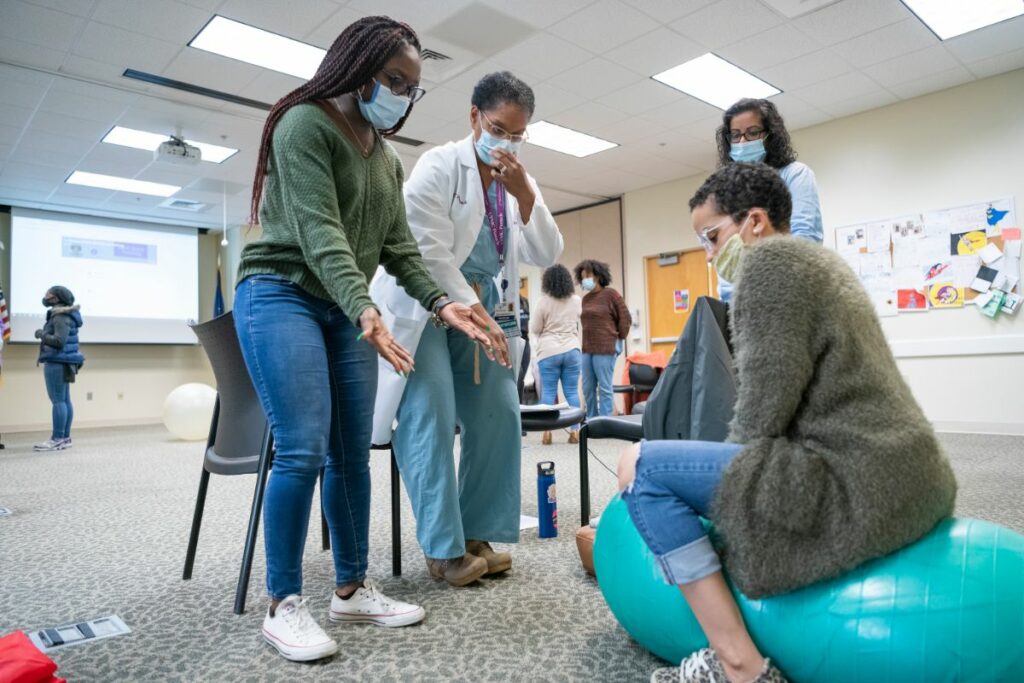
We’re pleased to recently award an LOHF Children’s Behavioral Health Grant to the Diversifying Doulas program of Patients R Waiting. We are excited to see how it will impact diversity in care for women of color and their children. We asked Sharee Livingston, DO, to give some insight to this program.
Dr. Livingston is the UPMC Lititz Ob/Gyn Department Chair and Diversity, Equity, and Inclusion Chair. She is a board member and organizer for Patients R Waiting and Co-founder of Diversifying Doulas Initiative, a program dedicated to eliminating maternal morbidity and mortality by increasing access to doula care for pregnant women of color, and increasing the number of Black and Brown doulas.
Please tell us about Patients R Waiting.
Most physicians and surgeons in the United States are white males from a high socioeconomic class. According to the US Census Bureau in 2017, 69.8% of physicians and surgeons were white, 21.1% were Asian, and 5.8% were African-American. Out of the 37%, women physicians only 2% are African-American women (1).
The earlier in the medical professional pathway that we begin to address diversity in medicine, the more successful we will be at improving this stagnant statistic. The pipeline to medicine becomes less leaky when we eliminate the potholes that creep in along the pathway. Patients R Waiting aims to eliminate health disparities by increasing diversity in medicine. It has three areas of focus: 1) increasing the pipeline of minority clinicians, 2) making the pipeline less leaky, and 3) supporting minority clinicians in practice. The pipeline programs start as early as middle
school to produce the most impact.
Congratulations to Patients R Waiting Diversifying Doulas program for being awarded an LOHF Spring 2021 grant. What is the goal of this specific program?
Studies have shown that minority patients are more likely to visit medical professionals who are minorities. Minority health care providers are also more likely than white physicians to practice in underserved communities and to treat larger numbers of minority patients, irrespective of income (2). As shown in the Oakland, California study of Black men, cardiovascular mortality can be reduced by 19% if care is provided by a racially concordant doctor (3).
There must be more diversity in medicine to avoid approaching healthcare through a single lens and a single set of values. It is important for healthcare providers to represent and relate to the populations that they serve. The Diversifying Doulas program is increasing the number of Black and Brown Doulas available to represent and relate to the diverse population of women who can benefit from their care.
When there is a single mindset and culture in medicine, we see a rise in health disparities. Marginalized communities “need support through comprehensive and sustained public health programs that address health and chronic conditions (at the individual level), implicit racial bias among health care professionals (at the interpersonal level), quality of care in hospitals predominantly serving non-Hispanic Black women (at the community level) and extended health insurance (at the societal level)” (4).
How will the grant help achieve this goal?
It is vital that we address health disparities by increasing diversity in medicine. By connecting with our patients through the diverse lens in which they exist – their culture, gender, sexual orientation, religious beliefs, and socioeconomic realities, we promote better outcomes. Because of the lack of diversity within doulas throughout Lancaster, we have provided women of color the formal training necessary to become a certified doula. Through a process curated by doulas themselves, we have increased the doulas of color in Lancaster by over 900%. The LOHF grant will help us continue this urgently needed progress.
How will it elevate mental well-being for youth, children, or young adults?
Doulas can help to meet the emotional support needed by providing care and education, virtually and in person. The paucity of doulas of color in Lancaster is also being addressed by our doula training program. Benefits of doula care can include reduction in anxiety, lower rates of C-sections, and much more. When a mother’s mental well-being is supported, her child’s mental well-being is supported.
LEARN MORE ABOUT:
Grantees Awarded Spring 2021 Children’s Behavioral Health Grants
LOHF Children’s Behavioral Health Grants
Diversifying Doulas
Patients R Waiting
References:
- U.S Census Bureau, Data USA Physicians and Surgeons, 2017
- https://chicagocrusader.com/how-diversity-in-the-dental-profession-could-mean-
better-care-for-minorities/ - Alsan M, Garrick O, et al. Does diversity matter for health? Experimental evidence from
Oakland. Am Econ Rev. 2019; 109 (12): 4071-4111.
https://www.aeaweb.org/article?id=10.1257/aer.20181446 - Joseph K.S., Boutin A, et al. Maternal Mortality in the United States. Obstetrics and
Gynecology. 2021; 137; 763-769.




